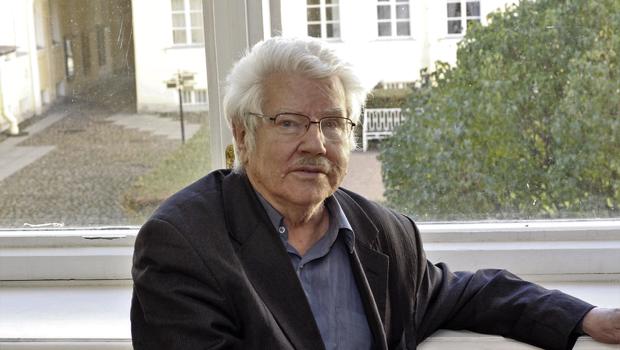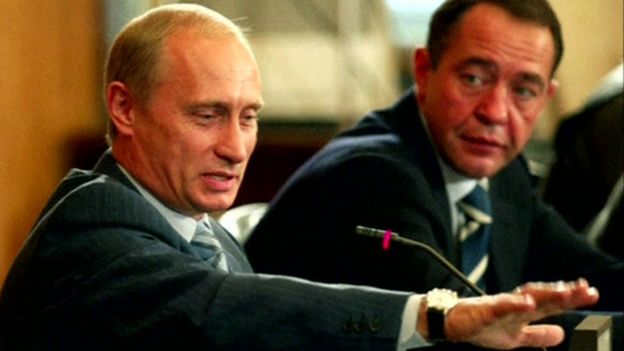Nicholas Andrushchenko dead after beatings.
 CBS writes the he covered human rights issues and crime.
CBS writes the he covered human rights issues and crime.
In this photo taken on Sunday, Oct. 9, 2016, prominent Russian journalist Nikolai Andrushchenko poses in St. Petersburg, Russia.
Those opposed to Putin or expose the Kremlin/FSB seem to have shorter lives.
Going back a few years to a major case of poisoning. With assassinations, Russian spies and rumours of the Kremlin’s dark influence back in the news, this documentary tells – for the first time – the inside story of the murder of a British citizen on British soil using the world’s deadliest poison, and of an international manhunt that led to the steps of the Kremlin. Alexander Litvinenko was killed in London with the radioactive poison polonium 210 in November 2006. The Scotland Yard detectives who led the murder investigation have never spoken publicly about it before. Together with the doctors who fought to save Litvinienko’s life – reveal the political and diplomatic obstacle course they faced in investigating the murder and tell how their quarries left a toxic trail through the heart of London.
Then there was the case of Mikhail Lesin, 59, found dead in a Dupont Circle hotel room. He was a former aide to Russian President Vladimir Putin. 
***
Russia suspicious deaths list updated today with a journalist who died after being attacked. Putin critics highlighted in yellow.pic.twitter.com/hmdemYhRMY
Image: Alexey Navalny / Instagram, edited by Kevin Rothrock
The Kremlin has finally decided to take on Alexey Navalny, four sources tell the independent television station Dozhd. According to two of the sources (identified only as “individuals close to the Kremlin”), the campaign against Russia’s opposition leader will start sometime soon.
Putin’s deputy chief of staff, Sergey Kirienko, has reversed the Kremlin’s longheld position that Navalny poses no genuine threat to the regime, according to a source who regularly meets with Kirienko. The administration’s concern is reportedly that Navalny could mar Putin’s likely re-election next March, when the Kremlin is counting on a “beautiful victory,” with high turnout and without the need for open repression against the political opposition.
According to Dozhd’s report, a special team from Putin’s domestic policy crew has set up a war room somewhere outside the Kremlin to generate material designed to discredit Navalny. Dozhd says Alexander Kharichev and Andrei Yarin — two of Putin’s top domestic policy officials — will oversee the mudslinging effort.
“They’re filming videos, making viral clips, and designing little video games to discredit Navalny. They’re fighting him like he’s Hitler,” a source told Dozhd.
Political analysts told Dozhd that the public can expect the campaign against Navalny to resemble the character assassination of former Prime Minister Mikhail Kasyanov, whose race for a seat in the State Duma derailed last year, after Russian network television aired hidden-camera footage of him cheating on his wife, which also precipitated a collapse of Russia’s democratic opposition alliance.
Online, where Navalny enjoys his greatest support and popularity, Russians are already mocking the news that the Kremlin is working on “videogames” to discredit the country’s most visible anti-corruption activist. “I can’t wait for the release of the videogame that will discredit Alexey Navalny,” Perm-based artist Anton Semakin tweeted sarcastically. “After the protests against corruption, the Kremlin has decided to crack down on Navalny, not on corruption,” the Russian comedian “Bob Farber” joked.
According to Dozhd’s sources, it was last month’s nationwide anti-corruption protests, spearheaded almost single-handedly by Navalny, that provoked the Kremlin’s new response. While the crowds may have represented only an infinitesimal sliver of the Russian population, Navalny’s anti-corruption efforts have undeniably coalesced into a larger movement. See RuNet Echo’s March 28 report on “Russia’s Youngster Uprising.”
And there’s statistical evidence that supports Navalny’s rising political profile: In early April, the Levada Center polling agency recorded a 10-percent drop in Prime Minister Dmitry Medvedev’s approval ratings after Navalny released a bombshell investigation accusing Medvedev of widescale corruption.
Packaged in a sleek and entertaining video presentation, Navalny’s allegations have attracted more than 19 million views on YouTube.


